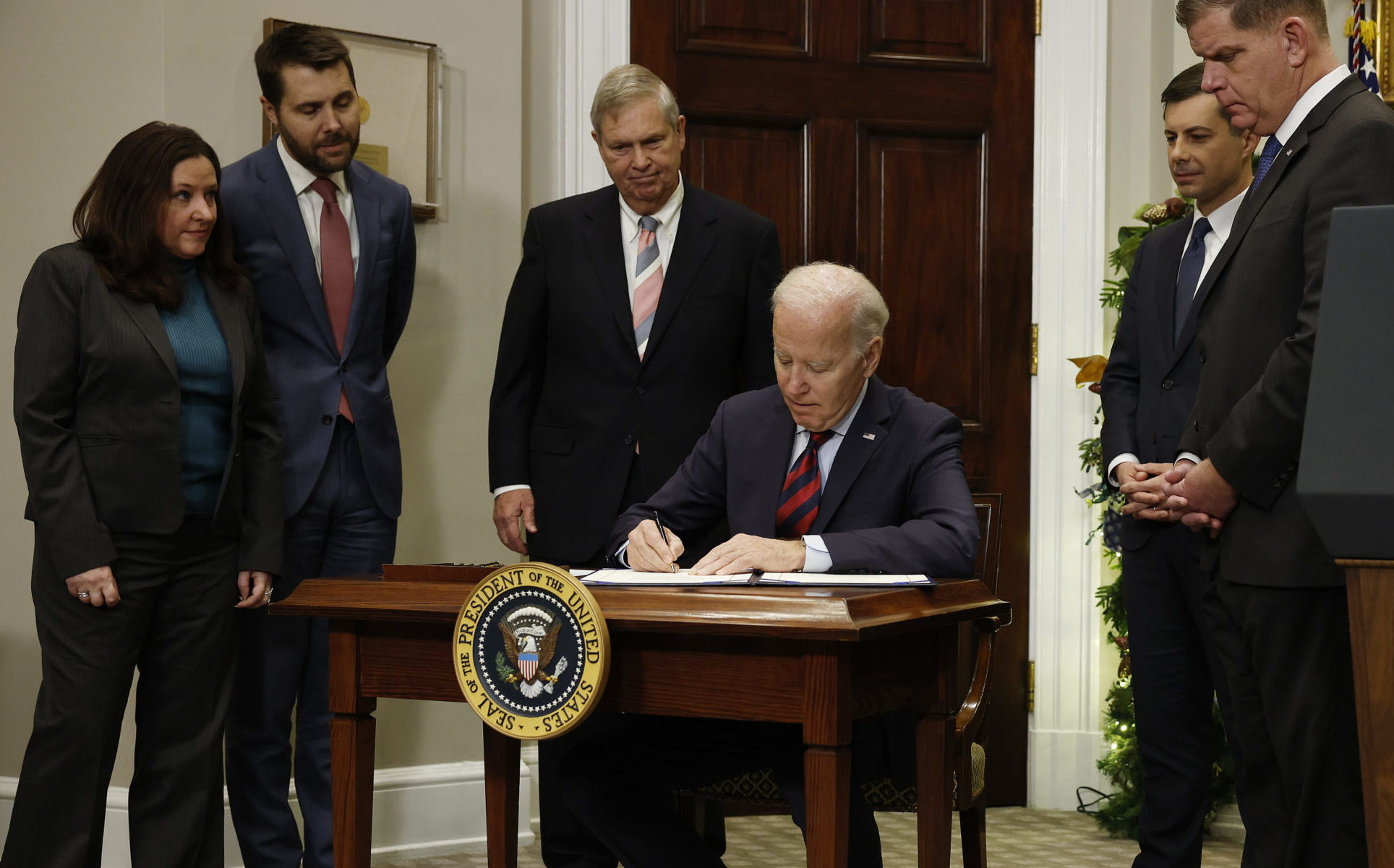Biden’s Rail Debacle Signals Shakeup
Biden prioritized efficiency over resiliency.

Scranton Joe’s decision to side with rail companies over rail workers in the intra-industry debate was stunning. Over the last few weeks, the companies risked a nationwide shutdown of freight rail because they wouldn’t give their workers any paid sick days. That is despite earning tremendous profits and paying out about $200 billion in dividends and stock buybacks over the past 12 years.
There has been and will continue to be a lot of political analysis of the decision, but one of the most underreported elements of the entire debacle is what in the world the labor union bosses were thinking.
When they cut a deal in September, they signed onto an agreement that didn’t address the core concern of their workforce: paid sick days. Sure, there was the addition of one personal day, as well as tweaks around the edges to the penalty system to allow a few days of unpaid leave for medical appointments—so long as they would be scheduled 30 days in advance, and only on a Tuesday, Wednesday, or Thursday. But the deal underwhelmed and alienated the rank-and-file—the men and women doing the hard work, as opposed to those sitting around in union offices.
It reveals the out-of-date and out-of-touch nature of our current collective bargaining system. Maybe, over time, it will prompt workers to seek alternative means of representation. There are good ideas out there, like my Teamwork for Employees and Managers (TEAM) Act, but it will probably take time for union members to see that their leaders are selling them out.
In the near term, though, it is increasingly clear that things are changing in American politics. Democrats voted overwhelmingly to ram the September agreement—an agreement in name only, as it was rejected by four unions, including the largest—down the throats of the workers. And they did so at the request of the companies, the labor leaders, and Joe Biden. The hardworking rail worker was left out in the cold, as far as those three were concerned.
My strong preference was to give the unions and the companies more time to negotiate a deal that would be acceptable to everyone, but Democrats rejected that idea as well. In the end, I voted in favor of adding seven days of paid sick leave to the tentative agreement. I did so not because I think it is Congress’s place to insert itself into these negotiations, but because the rail industry asked us to insert ourselves. And in the rail industry, I saw echoes of problems I’ve seen across the economy.
Nearly four years ago, I wrote about the tradeoff between efficiency and resiliency. Our economy had become too focused on efficiency—send this job to China, make that product overseas, cut this workforce by one-third. We didn’t see what that efficiency had cost us, from having access to medical supplies during a pandemic to retaining critical manufacturing capacities to providing dignified work to Americans.
In the freight rail industry, our hyper-efficiency mindset created something called PSR, or precision-scheduled railroading. The goal is to lower operating costs by extracting the greatest possible amount of work out of the smallest possible number of employees. From a dollar and cents perspective, it is a clear winner. The freight rail industry cut nearly one-third of its employees over the past six years and profits nearly doubled as a result.
While greater efficiency can bring positive things, including lower prices, it is also possible to have too much of a good thing. When workers are treated as little more than line items on a spreadsheet, they become no different from the freight cars they service or the track they monitor. They aren’t able to be mothers or fathers, husbands or wives, coaches or volunteers. Do we really want to live in an economy that only exists to serve consumers with the lowest possible prices, no matter what collateral damage it inflicts?
One of the dirty little secrets of the freight rail industry is just how fragile it has become. The lack of staff means that a single sick employee can derail an entire work plan. Delays can ripple across the network, which is why people risk punishment for calling in sick. It is the same reason why it is incredibly difficult for employees to schedule their vacation days. And it is why many manufacturers who use rail to transport their materials believe that quality of service has declined over the past year.
Subscribe Today
Get daily emails in your inbox
This is the ongoing story of industry across the U.S. Before the pandemic, most Americans gave little thought to overseas supply chains or just-in-time inventory management systems. Then, suddenly, we found out China was hoarding critical supplies and our store shelves were empty. It quickly became clear that our nation’s political and economic leaders—Democrats and Republicans alike—had prioritized economic efficiency over resiliency, financial gains over Main Street investment, and individual enrichment over the common good.
In the years since, we’ve seen a growing acknowledgment of the need to bring critical industries back to the United States. It comes with a recognition that just because something is cheaper, it doesn’t mean it’s better—especially if low prices require the destruction of American communities and reliance on far-flung supply chains.
Congress should never have been involved in Biden’s rail debacle, but any time corporations bring something to the Senate floor, I am going to do what is right for our country and its workers, even if it means shaving off a fraction of Wall Street’s annual returns.
Comments